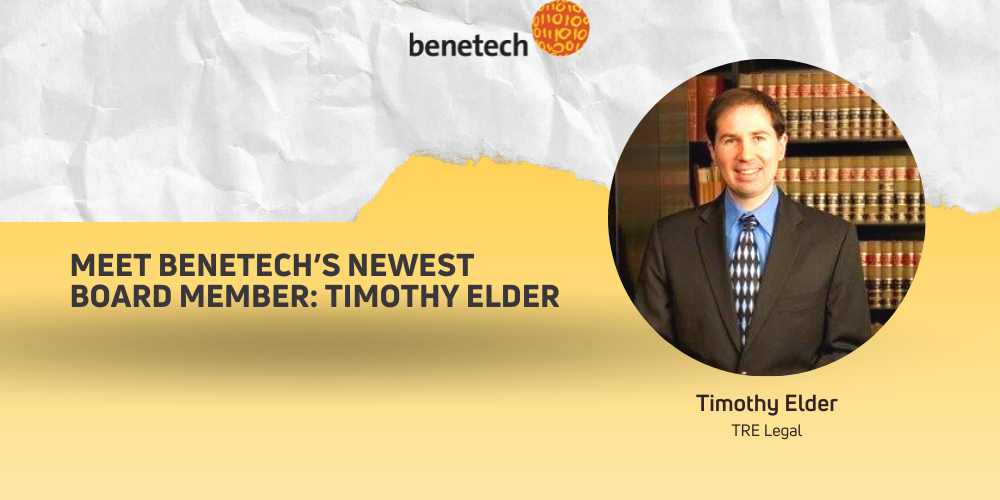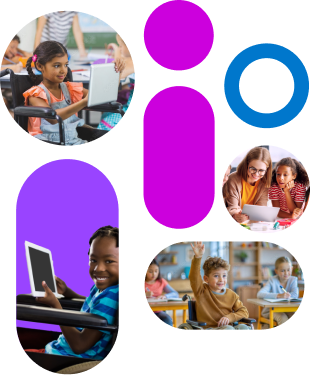Meet Benetech’s Newest Board Member: Timothy Elder

Benetech is proud to welcome our newest board member, Timothy Elder. Timothy is a civil rights lawyer focusing on disability rights, specifically the rights of people who are blind or have other disabilities, to access employment, education, government programs, public accommodations, assistant accessible technology and other aspects of education and society. See his full bio here: https://benetech.org/about/leadership/#timothy-elder
Timothy recently met with Benetech employees to share more information about his background and reasons for committing to the Benetech Board of Directors. Below is a recap of answers Timothy provided to a few questions posed by Benetech employees.
How do your career and your interests align with joining the Benetech board?
I am a civil rights attorney. I come from a Silicon Valley perspective on technology disruption, and love using technology for good. Due to my blindness, I have a strong commitment to digital accessibility, and the legal practice I have created expresses my interest in blindness, fairness, equal access, and equity. Much of my practice involves strategic impact cases. Benetech and I have a mutual interest in systemically promoting equity and digital access in ways that are affirmative and proactive. Litigation is just one tool to promote access. The work Benetech does in programming and providing resources like Bookshare is another complementary approach.
As a user of Bookshare, how has it impacted your life?
Aside from my career, as a blind person who enjoys reading, I have a strong connection to what Bookshare has achieved. As a child in the K-12 system, I had no access to my curriculum. As I sat in the back of the classroom, I thought I could just listen and understand. My undergraduate program allowed me to go through most of it without ever having to read the same educational materials as my classmates, which was a huge disservice to me. The materials should have been helpful to me, but as a blind person I slipped through the cracks. Reading seemed impossible to me going forward. At that stage in my life, I felt a sense of loss, like I was not going to be able to continue to enjoy literacy. Braille, screen readers and other assistive technology were still foreign to me at that stage in life.
As a law student, I became aware of screen readers, Bookshare, and the availability of accessible educational materials. Discovering alternative formats for educational materials was a life-changing experience. To think you have lost something and then get it back creates a huge appreciation for what you thought you had lost. As a result, I am an avid supporter of Bookshare and the accessibility of educational materials. We must help disabled students understand what is out there for them.
What improvements have you come across in the accessibility of educational materials?
There’s good news, the US Department of Education has provided strong guidance for education administrators that say if you buy materials, make sure they’re accessible; The federal government has been doing this for quite a while. Legal requirements are getting stronger and stronger. Regulations will be issued by the Department of Justice requiring accessibility of websites. Almost all new curriculums are online, so Title II regulation, which is currently being reviewed, should ensure accessibility of these curriculums too.
K-12 school procurement concerns me as they often don’t have a lot of money. They thus buy lower cost solutions, which may lack proper attention to accessible design and WCAG compliance. Unfortunately, it’s a system where the school district is legally responsible for this content but may not be able to fix or remediate any of it; it’s the developer, the resource provider, who really has all the power to rectify the system. I’m working on legislative fixes to solve for this problem.
What is the emerging role you see Benetech playing in equitable education?
The rise of AI is a huge opportunity for Benetech to scale and make the remediation of books into accessible formats much more efficient. I am excited to take advantage of the AI revolution that is going on right now to remediate accessible content. Online interactive curriculum presents a lot of opportunities to access educational materials that weren’t available in electronic formats when I was a younger student. There’s also potential to innovate in the screen reader space. Benetech’s technology initiatives are good and can be used in many areas. My goal is to help ensure that this happens in a way that is useful and innovative for blind and other disabled students.
To learn more about Tim and other board members, Please visit: https://benetech.org/about/leadership/
